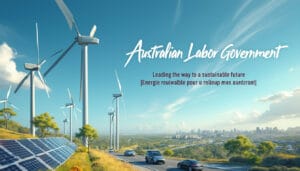_Tasmania has lost one of its most respected leaders with the passing of Tony Rundle at the age of 86._
_Former Premier of the State, he led during a period marked by tragic events and significant reforms._
_His legacy rests on decisive actions for the community and the environment._
Throughout his tenure, Tony Rundle reshaped Tafe Tasmania and established Service Tasmania, thereby strengthening the educational and administrative infrastructure of the State. He also negotiated Australia’s first regional forest agreement, demonstrating his commitment to sustainable resource management. In response to the Port Arthur tragedy, Rundle emerged as a figure of strength and compassion, collaborating with Prime Minister John Howard to reform gun laws, positively impacting the entire nation. His involvement in the BassLink project and the official apology to the Aboriginal community reflect his inclusive and innovative vision for a more sustainable future.
Table of Contents
ToggleLive Australian Elections 2025: Dutton Remembers a Father Filled with Anxiety for Father’s Day and the Vice-Chancellor Calls for an End to Attacks on International Students
The 2025 Australian elections promise to be particularly tumultuous, marked by personal narratives and major societal issues. Among the key moments, Peter Dutton shared a poignant anecdote about his father, while Vice-Chancellor Penny Wong made an urgent call to protect international students from rising attacks. These events reflect the complex dynamics and priorities of Australian voters as the elections approach.
How Does Dutton’s Personal Narrative Influence His Election Campaign?
At a rally in Tasmania, Peter Dutton, leader of the opposition, shared a touching personal story to illustrate his commitment to families and the local community. He recounted how, on one Father’s Day, he took his father for a drive in a Porsche on the Symmons Plains track. This moment, while joyous, nearly turned tragic when the car began to skid. Fortunately, everything ended well, but this experience left a deep imprint on Dutton.
By recalling this incident, Dutton aimed to showcase his ability to handle stressful situations and make quick decisions—qualities he emphasizes for leading the country. He also announced an investment of 18 million dollars to improve local infrastructure, including the Symmons Plains track, thereby underscoring his commitment to economic development and job creation in Tasmania.
This narrative approach seeks to humanize Dutton and strengthen his connection with voters, demonstrating that he understands the challenges and aspirations of Australian citizens. By integrating personal elements into his campaign, Dutton hopes to create an image of an accessible and empathetic leader capable of guiding the country with compassion and determination.
What are the Implications of Penny Wong’s Calls Against Attacks on International Students?
Vice-Chancellor and Minister for Foreign Affairs, Penny Wong, recently called for an end to attacks directed at international students in Australia. She emphasized the importance of these students not only for the education sector but also for the national economy. According to Wong, international students significantly contribute to cultural diversity and innovation, while also being key players in the country’s technological and economic development.
In response to criticism and restrictive policies aimed at reducing the number of international students, Wong urged for a more inclusive and protective approach. She highlighted the mutual benefits of increased cooperation between Australia and the home countries of students, particularly in research and development in renewable energies. To learn more about the challenges and opportunities related to renewable energies, check out this detailed article on Green Just Now.
Wong’s speech occurs in a context where tensions against immigrants and foreign students have increased, fueled by political debates and economic concerns. She insists that protecting international students is not only a human rights issue but also a crucial strategy to maintain Australia’s competitiveness on the global stage. By calling for an end to the attacks, Wong seeks to rally voters in favor of an open and supportive policy, contrasting with the more nationalist positions of certain parties.
What is the Impact of Dutton and Wong’s Policies on the Australian Electoral Landscape?
The contrasting approaches of Peter Dutton and Penny Wong reflect the deep divisions within Australian society as the elections of 2025 approach. Dutton, by emphasizing personal narratives and local investments, attempts to consolidate his traditional base while attracting new voters through his commitment to families and regional economic development.
On the other hand, Wong positions herself as an advocate for the rights of international students and diversity, highlighting the economic and cultural benefits of inclusion. Her call to end attacks on students is part of a broader strategy aimed at promoting an image of Australia as open and welcoming, essential for attracting talent and supporting growing sectors, particularly in renewable energies.
This political duality is also illustrated by the debates on environmental policies. For example, the current government is heavily betting on renewable energies, as highlighted in this article on Green Just Now, while opponents may criticize these initiatives as costly or ineffective.
Furthermore, Dutton’s statements regarding the protection of local industries such as salmon farming and forestry, contrasted with the environmental concerns of his political adversaries, illustrate the dilemma Australia faces: finding a balance between economic development and ecological sustainability. This balance is all the more crucial in a global context where climatic and economic issues are increasingly interconnected.
How Do Social and Economic Issues Influence Australian Voting?
Social and economic issues play a decisive role in the behavior of Australian voters. The policies proposed by candidates, whether concerning international students, renewable energies, or local development, resonate differently according to citizens’ priorities. For instance, Penny Wong’s call to protect international students aims to attract voters who value inclusion and diversity while acknowledging this group’s economic importance.
Moreover, local investments and Dutton’s initiatives to improve infrastructure in Tasmania address the needs of regional communities, often neglected by major metropolitan areas. These actions are perceived as concrete commitments to enhance quality of life and stimulate local economies, which may positively influence voting in these areas.
Environmental concerns are also at the heart of electoral debates. Australians are increasingly aware of climate issues, and policies on renewable energies are scrutinized closely. The increase in investments in this sector, as noted in the article from Green Just Now, can be a key factor for voters concerned about the country’s ecological future.
Finally, issues of security and social welfare, particularly concerning international students and immigrants, also influence voting. Wong’s inclusive and protective policies may attract those who support an open society, while Dutton’s calls to protect local industries and invest in infrastructure may appeal to voters focused on economic development and local stability.
What are the Challenges and Opportunities for Candidates in These Elections?
Australian candidates face a series of unique challenges and opportunities as the 2025 elections approach. One of the main challenges is to meet the varied expectations of voters who are concerned about issues ranging from the economy and employment to human rights and environmental sustainability.
For Peter Dutton, the challenge lies in maintaining his appeal to traditional voters while broadening his base by addressing contemporary issues such as economic security and local infrastructure. His personal narrative and financial commitments to local projects are strategies intended to humanize his campaign and demonstrate accessible and pragmatic leadership. However, he must also convince voters that his policies effectively balance economic development with social responsibility.
On the other side, Penny Wong must navigate a political landscape where anti-immigrant tensions and debates on inclusion policies are increasingly pronounced. Her call to protect international students is a strategic response aimed at reinforcing support among educational elites and multicultural communities. However, she must also address the concerns of voters worried about employment and economic security, demonstrating that inclusive policies can coexist with robust economic growth.
Candidates must also navigate between local and national issues, adapting their messages to the specific needs of each region while maintaining a coherent vision for the entire country. Opportunities lie in the ability to propose innovative and inclusive solutions to current challenges, while capitalizing on global trends such as energy transition and educational globalization.
In parallel, the rise of extremist political movements and populist discourse represents a double opportunity and risk. Candidates must position themselves clearly on key issues to attract moderate voters while avoiding fueling social divisions. The balance between firmness and empathy is essential for navigating this complex political climate.
What is the Importance of Renewable Energies in the Electoral Debate?
Renewable energies are at the heart of the Australian electoral debate, reflecting the growing importance of environmental sustainability in national priorities. The current government, with increased funding for renewable energies, seeks to position Australia as a leader in the green sector, which is detailed in the article from Green Just Now.
This strategy aims not only to reduce the country’s carbon footprint but also to stimulate technological innovation and create jobs in new green industries. For voters, this represents an opportunity to participate in a more sustainable and resilient future economy. Policies in favor of renewable energies are often seen as an investment in the future, offering solutions to climate challenges while supporting economic growth.
However, this direction is not without controversy. Some voters and opposing politicians criticize the high costs associated with these investments and question the long-term viability of certain renewable technologies. They argue that resources should be allocated to more traditional sectors or that alternative solutions, such as nuclear energy, should be explored. This debate underscores the need to find a balance between environmental ambition and economic pragmatism.
The importance of renewable energies is also influenced by international dynamics. The article from Green Just Now shows how global political movements attempt to manipulate energy policies for electoral gains, highlighting the need for Australia to remain vigilant and proactive in its energy transition.
Moreover, local initiatives and community projects play a crucial role in the adoption of renewable energies. Voters are increasingly aware of the impact of their energy choices and seek policies that support sustainable and accessible solutions for all. Candidates who can demonstrate a clear and achievable commitment to renewable energies are likely to gain the support of environmentally conscious voters.
How Do Educational Policies Influence Elections?
Educational policies are another crucial aspect influencing the Australian elections. The issue of international students is particularly sensitive, as it is linked to both the economy and the social relations of the country. Decisions regarding the number of foreign students admitted and the support measures they receive can have significant repercussions on Australia’s image as a leading educational destination.
The debate surrounding international students is exacerbated by restrictive policies proposed by some parties, such as drastic reductions in foreign admissions. These measures are often justified by economic or social concerns but attract criticism regarding their negative impact on diversity and innovation. Penny Wong, as Vice-Chancellor, firmly defends the importance of protecting these students, emphasizing their key role in the education sector and their contribution to the national economy.
Candidates must therefore navigate between the expectations of voters who seek to preserve the economic and educational advantages of international students and those who are concerned about the pressures on local resources. The ability to propose balanced policies that support both foreign students and national residents will be crucial in attracting a wide range of voters.
In addition, initiatives aimed at improving accessibility and quality of education for all, including international students, are critical. Scholarship programs, grants for educational infrastructure, and partnerships with international institutions can bolster Australia’s position on the global educational stage. To learn more about the generational challenges facing climate change, check out Green Just Now.
Educational policies also influence public opinion regarding technological development and the preparation of young generations for future challenges. Programs focused on science, technology, engineering, and mathematics (STEM) are particularly valued, as they are perceived as essential for maintaining economic competitiveness and innovation. Voters are attentive to candidates’ promises regarding improving education and creating pathways for international students, which can greatly influence their voting decisions.
How Do Housing and Economic Issues Affect Voters?
The housing and economic issues are at the center of Australian voters’ concerns, strongly influencing the dynamics of the 2025 elections. The rising prices of real estate and the shortage of affordable housing are persistent problems affecting a large number of citizens. Proposals for policies aimed at reducing pressure on the housing market, such as reducing the number of international students to decrease demand for housing, are controversial and divide public opinion.
Peter Dutton, in his campaign, has linked these concerns to immigration policies and the admissions of foreign students. By announcing a significant reduction in international students, he aims to address worries about housing availability and pressure on local infrastructure. However, this approach can also be perceived as stigmatizing immigrants and foreign students, presenting a challenge in terms of public perception and social cohesion.
In contrast, Penny Wong highlights the economic benefits of international students, underscoring their contribution to the economy and cultural diversity. She argues that foreign students are essential for maintaining a dynamic education sector and attracting talent that stimulates technological and economic innovation. This perspective is supported by studies and economic analyses available on Green Just Now, underscoring the strategic importance of international students for Australia’s economic future.
Voters are often torn between immediate concerns related to housing and the long-term benefits of maintaining a steady flow of international students. Candidates must therefore propose balanced solutions that address current needs while supporting sustainable economic growth. Inclusive housing policies, investments in infrastructure, and initiatives to increase the supply of affordable housing are crucial aspects that voters seek in political platforms.
Additionally, the global economy and employment prospects play a decisive role in voter behavior. Dutton’s promises regarding local investments and the protection of local industries aim to reassure voters about economic stability and job creation. In contrast, Wong’s proposals for an open and dynamic education sector seek to attract foreign investments and stimulate innovation, thereby contributing to a more robust and diversified economy.
What are the International Issues Impacting Elections in Australia?
International issues play a significant role in the Australian elections, influencing not only domestic policies but also Australia’s perception on the global stage. Relations with neighboring countries, strategic alliances, and global challenges such as climate change and international migrations are at the center of electoral debates.
The candidates’ initiatives regarding foreign policies and international cooperation can strongly influence voter support. For example, Australia’s commitments to climate agreements and partnerships in regional security can be strong points for voters concerned about the country’s international standing.
Peter Dutton, with his experience as Minister for Home Affairs and Minister for Foreign Affairs, emphasizes the need to strengthen alliances and protect national interests in a complex geopolitical context. His proposals include initiatives to secure borders and limit uncontrolled immigration, which resonates with some voters concerned about security and national identity.
On the other hand, Penny Wong, as Minister for Foreign Affairs, advocates for a more open and collaborative approach. She underscores the importance of international relations for trade, education, and security and advocates for inclusive policies that promote cooperation and mutual support among nations. Her discourse highlights the need to maintain strong ties with international partners to ensure Australia’s economic and political stability.
International issues such as geopolitical tensions in the Asia-Pacific, challenges related to climate change, and humanitarian crises also influence voters’ priorities. The candidates’ proposals to address these challenges, whether through diplomatic initiatives, investments in green technologies, or balanced immigration policies, are crucial to gaining voter trust and support.
Furthermore, recent global events, such as economic sanctions or migration crises, can have direct repercussions on the Australian economy and society, thus influencing voter preferences. Candidates must demonstrate their capacity to navigate this complex international landscape and propose effective solutions to protect national interests while maintaining a positive and proactive image on the global stage.
What are the Key Economic Issues Addressed by Candidates?
The economic issues are at the heart of Australian voters’ concerns and play a decisive role in the 2025 electoral race. Candidates address a variety of economic topics, from job creation and stimulating economic growth to managing inflation and redistributing resources.
Peter Dutton highlights his plans to strengthen local industries and protect Australian jobs. His announcements of investments in wood manufacturing programs and support for local industries aim to stimulate the regional economy and create sustainable jobs. By emphasizing his financial commitments, Dutton seeks to reassure voters about his ability to manage the economy and promote financial stability.
Meanwhile, Penny Wong insists on the importance of innovation and renewable energies for Australia’s future economy. She defends investments in green technologies as a strategy to diversify the economy and reduce dependence on fossil fuels. This approach aims to position Australia as a global leader in the renewable energy sector, attracting foreign investments and creating jobs in growing industries.
Candidates also address housing and cost of living issues, which are essential for voters. Dutton proposes measures to increase the supply of affordable housing and reduce pressure on the housing market, while Wong emphasizes inclusive solutions that consider the needs of international students and immigrants.
Another key economic issue is managing inflation and citizens’ purchasing power. Fiscal policies and initiatives to reduce energy costs are discussed as ways to support Australian families in the face of rising prices. Proposals to subsidize household batteries, as mentioned by the current government, are seen as concrete measures to help households save on their energy bills while supporting the transition to clean energies.
Finally, candidates must address issues of international trade and economic relations. Australia’s ability to maintain strong trade partnerships and navigate a constantly evolving global economic environment is crucial for economic growth. Proposals for trade policies, support for exporters, and market diversification are essential elements in attracting voters concerned about the country’s economic future.
How Do Climate Issues Influence Electoral Debates?
Climate issues have become unavoidable aspects of electoral debates in Australia, reflecting an increased awareness of the impacts of climate change on the environment, the economy, and society. The environmental policies proposed by candidates are closely scrutinized by voters, who seek effective and sustainable solutions to face climate challenges.
Penny Wong, as Vice-Chancellor, highlights her government’s initiatives to reduce carbon emissions and promote renewable energies. She emphasizes the importance of technological innovation and the energy transition to ensure a sustainable future. Her call to end attacks on international students is also part of a broader vision of global cooperation to combat climate change.
Meanwhile, Peter Dutton underscores the necessity of finding a balance between economic development and environmental responsibility. While he supports local industries, he also acknowledges the importance of sustainable practices to maintain long-term economic competitiveness. His proposals include investments in clean technologies and support programs for businesses to adopt eco-friendly practices without sacrificing economic growth.
Voters are increasingly sensitive to candidates’ promises regarding combating climate change. Initiatives aimed at promoting sustainability, investing in renewable energies, and protecting natural ecosystems resonate particularly well among young voters and environmental activists. Candidates who can demonstrate a strong commitment and realistic plans to combat climate change are likely to garner significant support.
Climate policies are not limited solely to reducing carbon emissions. They also encompass aspects such as resilience to natural disasters, protection of natural habitats, and equitable transitions for workers in polluting industries. Therefore, candidates must propose holistic strategies that address these multiple facets to meet voter expectations and ensure an effective transition to a green economy.
Finally, climate issues are intrinsically linked to social justice and equity questions. Vulnerable communities are often the most affected by the impacts of climate change, and policies must therefore include support and protection measures for these populations. Voters expect candidates to recognize these injustices and propose inclusive solutions to ensure that the transition to a green economy benefits all segments of society.
What are the Impacts of Immigration Policies on the Australian Economy?
Immigration policies are closely tied to the Australian economy, influencing key sectors such as education, technology, and health. Decisions regarding the admission of immigrants and international students have direct repercussions on the country’s economic competitiveness and its capacity to innovate and grow.
Peter Dutton, with his firm stance on reducing the admissions of international students, argues that this can help alleviate pressure on the housing market and local infrastructure. He claims that limiting the number of foreign students could contribute to easing cost of living issues and protecting local jobs. However, this approach is criticized for its potentially negative impacts on revenues generated by the educational sector and on the country’s cultural diversity.
Penny Wong, on the other hand, defends the economic benefits of international students, emphasizing that they significantly contribute to the education sector and to the economy as a whole. She argues that foreign students bring diverse skills and perspectives, stimulate innovation, and strengthen international economic ties. According to her, a more open immigration policy is essential for maintaining economic growth and Australia’s global competitiveness.
The impacts of immigration policies are also manifested in job creation and local skills development. International students, particularly those in STEM fields (Science, Technology, Engineering, Mathematics), play a crucial role in strengthening the country’s technological capabilities. Their presence in universities and businesses stimulates innovation and fosters economic growth.
Furthermore, immigration policies influence international relations and trade partnerships. An inclusive and welcoming approach can strengthen strategic alliances and open up new business opportunities, while a restrictive policy can isolate the country and limit its global cooperation possibilities. Therefore, candidates must balance economic interests with social and ethical considerations to propose immigration policies that support sustainable and inclusive economic growth.
Finally, immigration policies have implications for Australian society as a whole. Balanced and well-managed immigration can enrich culture, foster integration, and strengthen social cohesion. Voters seek solutions that not only support the economy but also promote a harmonious and diverse society. Candidates who can propose balanced and inclusive immigration policies are better positioned to meet voter expectations and ensure sustained and equitable economic growth.
#>
Articles similaires
Thank you!
We will contact you soon.













